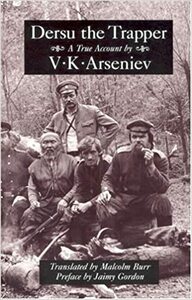Take a photo of a barcode or cover
Sometimes you read something because a friend recommends it. Sometimes the book isn't your cup of tea but is obviously a masterwork of its genre. Sometimes the book is mind expanding and horizons broadening during a time when you needed both. This is exactly such a book for me.
Fascinating account of exploration in the Soviet Far East - the rugged, nearly impenetrable terrain, the insane biological diversity. Arsenyev had to contend with bears, tigers, moose, you name it. But these particular surveys are joined by a common threat: Dersu the Trapper. An indigenous man who shows up at the Russian camp in the dead of night hoping for food. This simple event results in a lifelong friendship between Arsenyev and Dersu. Dersu accompanies the Russian on two expeditions.
In the end, it is a poignant story of an aging man whose skills begin to fade and a friend who attempts to ease his later years but is unable to convince Dersu to make peace with urban life. For a man who had never lived in a house, four walls feel like prison.
One of my favorite reads in recent memory. I first saw mention of Dersu the Trapper in John Vaillant's excellent book The Tiger. Tracked it down on abebooks.com since it is not in print but is definitely worth the read if you can find a copy.
In the end, it is a poignant story of an aging man whose skills begin to fade and a friend who attempts to ease his later years but is unable to convince Dersu to make peace with urban life. For a man who had never lived in a house, four walls feel like prison.
One of my favorite reads in recent memory. I first saw mention of Dersu the Trapper in John Vaillant's excellent book The Tiger. Tracked it down on abebooks.com since it is not in print but is definitely worth the read if you can find a copy.
I first picked up this book after reading John Vaillant's thrilling book The Tiger, about a man-eating tiger in the taiga of Ussuria. I had also seen Kurosawa's film Dersu Uzala, and always thought that it was his oddest film but admittedly one of my favorites outside of his samurai classics. This book is a fairly interesting read, but not as engaging as I had hoped. As the narrative is in its essence the chronicle of a surveying expedition, it tends to get bogged down by repetition of which mountains were climbed and what rivers were forded and what various trappers and ginseng foragers were met along the way. It's worth reading for the interactions between Arseniev and Dersu, and for the lessons that Dersu teaches Arseniev about the wilderness of Ussuria, but Arseniev is not a master of language (maybe that's saying more about the translation than Arseniev), and any philosophical or poetic tidbits you must glean from the text on your own.
If you currently lament the loss of the natural world and the exploitation of its resources and indigenous people, read this account of the same behavior from 115 years ago.
I’d seen the Kurosawa film and knew it was based on real people but was not aware of the book which is a classic. It did not disappoint. A matter of fact narrative of three expeditions from 1902-1908 in the Siberian Far East conducted by Arseniev. But it’s also a lament on the treatment of nature and indigenous peoples by “civilized” man.
Arseniev is like a Russian John Muir as he chronicles the flora and fauna of the taiga and mountains in the Ussuria region. He laments the wastage in game perpetrated by the Chinese as well as their exploitation of indigenous peoples into peon like slavery through debt and opium addiction. Arseniev routinely starts in May and finishes in November. He tends to minimize his role in the planning and logistics required but one knows it was anything but that. There’s a high level of spontaneity too. It’s a team effort with natives and Cossack soldiers. The Cossacks are real mountain men and show their endurance and resilience.
It is on the first expedition that Arseniev meets Dersu in the forest and they soon become inseparable. Dersu possesses a sixth sense and his skill as a tracker borders on the sublime. He’s like Mr Miyagi in The Karate Kid. His benevolent character endears him to even the rough and tough Cossacks. Lots of danger from not only the tigers and bears but also the weather. Dersu saves Arseniev’s life when a blizzard traps them.
By the third expedition Dersu is losing his keen vision which enables him to sight in on game. Arseniev offers his home in town to him. It’s too difficult an adjustment for Dersu as he chops a tree down in a park and is arrested. Arseniev then arranges for Dersu to live with a friend in the mountains. Shortly afterwards Arseniev is notified that Dersu’s body has been found. The book ends with Arseniev going back a year or two later to visit Dersu’s grave and unable to locate it due to development.
I’d seen the Kurosawa film and knew it was based on real people but was not aware of the book which is a classic. It did not disappoint. A matter of fact narrative of three expeditions from 1902-1908 in the Siberian Far East conducted by Arseniev. But it’s also a lament on the treatment of nature and indigenous peoples by “civilized” man.
Arseniev is like a Russian John Muir as he chronicles the flora and fauna of the taiga and mountains in the Ussuria region. He laments the wastage in game perpetrated by the Chinese as well as their exploitation of indigenous peoples into peon like slavery through debt and opium addiction. Arseniev routinely starts in May and finishes in November. He tends to minimize his role in the planning and logistics required but one knows it was anything but that. There’s a high level of spontaneity too. It’s a team effort with natives and Cossack soldiers. The Cossacks are real mountain men and show their endurance and resilience.
It is on the first expedition that Arseniev meets Dersu in the forest and they soon become inseparable. Dersu possesses a sixth sense and his skill as a tracker borders on the sublime. He’s like Mr Miyagi in The Karate Kid. His benevolent character endears him to even the rough and tough Cossacks. Lots of danger from not only the tigers and bears but also the weather. Dersu saves Arseniev’s life when a blizzard traps them.
By the third expedition Dersu is losing his keen vision which enables him to sight in on game. Arseniev offers his home in town to him. It’s too difficult an adjustment for Dersu as he chops a tree down in a park and is arrested. Arseniev then arranges for Dersu to live with a friend in the mountains. Shortly afterwards Arseniev is notified that Dersu’s body has been found. The book ends with Arseniev going back a year or two later to visit Dersu’s grave and unable to locate it due to development.
This is an important book. And not because it inspired George Lucas' characterization of Yoda, or because Kirosawa's film version inspired elements in the SW films. As a Star Wars fan, I chalk that up to happy coincidence.



